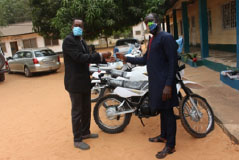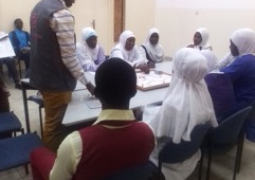
FAO procured the items including 1 desktop computer and printer, 3 laptops and 15 android tablets through an FAO funded Technical Cooperation Programme (TCP) titled “Integrated National Emergency Response to Avian Influenza in The Gambia”. The motorcycles are meant to strengthen extension service delivery and disease surveillance at border posts whilst the IT equipment are meant to enhance data collection and reporting.
Mr. Mustapha Ceesay, Assistant FAO Representative and Head of Programmes handed over the items to Mr. Abdou Ceesay, Director General, DLS at a brief ceremony at the Department’s Complex in Abuko.
In his statement, Mustapha Ceesay said the TCP is one of the areas through which FAO assistsMember States to build capacities for improved delivery for food and agriculture and meet the Sustainable Development Goals. He noted that the hand-over aimed at strengthening the capacity of the DLS for effective service delivery and safeguarding public health, livelihoods, food security and nutrition in the Gambia. . He explained that the TCP titled “Integrated National Emergency Response to Avian Influenza in The Gambia” has a budget of GMD12million. The TCP addresses the FAO Country Programming Framework and the National Development Plan (NDP) Outcome 3.2: Value chains enhanced for Agriculture and Livestock Transformation; Outcome 11.2: Emergency and Disaster Risk Reduction and Response strengthened at all levelsas well as the NDP Result Area 2: Increased livestock production for food self-sufficiency in animal and animal products.
“FAO hopes that the intervention will enable the country to fully prepare against the highly infectious and deadly avian influenza ravaging the poultry industry and livelihoods across the world,” Mr. Ceesay said.“The TCP has supported mass public awareness activities across the country. It has also facilitated a study tour to neighbouring Senegal by the staff of the DLS to help strengthen their capacities.”
For his part, Mr. Abdou Ceesay expressed profound appreciation and gratitude to FAO on behalf of the Ministry of Agriculture for the gesture. He described the TCP as timely, noting that FAO remains a true and consistent partner and supporter of the Ministry of Agriculture and his Department. He explained that through the TCP’s support, poultry farmers and stakeholders across the country have been sensitized on the prevention, control and management of Avian Influenza and to strengthen the risk management of the poultry value chain.
“The motorbikes and IT equipment will help enhance the surveillance and reporting on all transboundary diseases,”he said expressing optimism that the intervention will contribute to the successful implementation of the project activities. “Mobility and accurate and timely data are key to the attainment of the project objective and we will make sure that the donated items are utilized effectively for the intended purpose”.
Project Background
The Gambia has endorsed the Sustainable Development Goals (SDGs), especially SDG 2 “End hunger, achieve food security and improved nutrition and promote sustainable agriculture” and is thus highly committed to addressing the food and nutrition challenges. The poultry industry provides employment opportunities to address food and nutrition insecurity. Increased poultry production and productivity provide a platform for youth and women employment, income generation, poverty reduction and attainment of food self-sufficiency.
National imports for poultry products in 2018 and 2019 stood at 20 928 and 429 525 Mt respectively for chicken meat, while eggs stood at 5 368 Mt and 79 011Mt respectively. There may be market dependency on imports because of limitations in national production capacity in terms of infrastructure and the high cost of production inputs, and high mortality of chicks.. To improve their livelihood status more support is required for, routine disease control such as for the highly pathogenic Avian Influenza and other veterinary services, inputs, advisory and training.
In January 2021, the Ministry of Agriculture and the National Disaster Management Agency (NDMA) announced the outbreak of the highly pathogenic Avian Influenza (bird flu) H5N1 in neighbouring Republic of Senegal. This led to a national ban on the importof poultry and poultry products to prevent the spread of the disease in the country. To address the issue, which is a threat to national food security, the country constituted a National Working Group on poultry and poultry products. The body comprises the Ministry of Agriculture, the Department of Livestock Services, the Gambia Livestock Marketing Agency, the National Poultry Cooperative, the National Livestock Owners Association, the Young Poultry Farmers Association and the Ministry of Trade, Industries and Employment. The Ministry of Agriculture also solicited support from FAO through a TCP to support national preparedness to respond to the emergency.
Read Other Articles In Headlines




